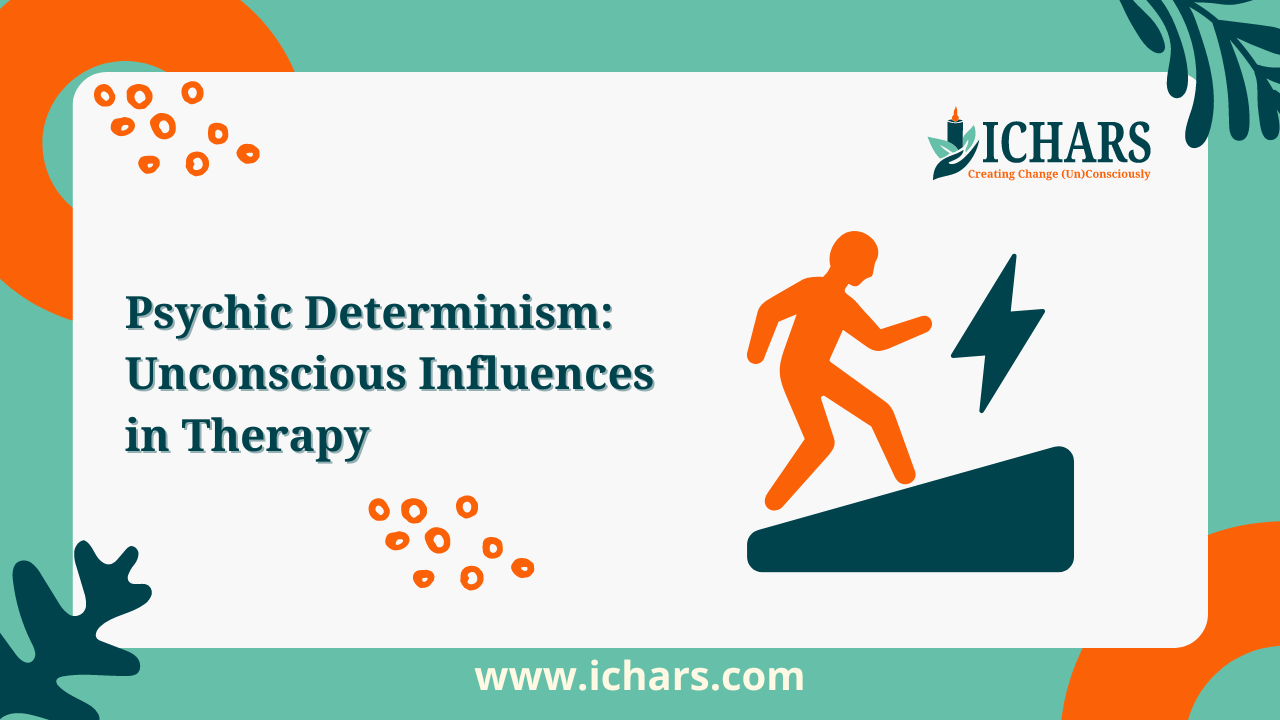In the dynamic field of psychology, practitioners constantly seek advanced skills to help clients overcome emotional and behavioural challenges. One such advanced concept is psychic determinism from psychoanalysis, which plays a crucial role in Cognitive Hypnotic Psychotherapy (CHP).
This article aims to provide a comprehensive understanding of psychic determinism, its relevance in modern psychotherapy, and its integration within CHP, offering psychologists a powerful toolkit for facilitating lasting change.
Understanding Psychic Determinism
Psychic determinism, introduced by Sigmund Freud, posits that all thoughts, feelings, and behaviours are determined by unconscious mental processes and past experiences. According to this concept, nothing in our mental life happens by chance; every action and reaction is influenced by internal forces, often beyond our conscious awareness.

Key principles include
- Unconscious Drives and Motives: Our unconscious mind harbors desires, fears, and motives that shape our conscious thoughts and behaviours.
- Early Childhood Experiences: Experiences from early childhood significantly impact our psychological development and influence our adult behaviours.
- Deterministic Nature: Thoughts, feelings, and behaviours are not random but are the result of intricate mental processes driven by unconscious factors.
Relevance of Psychic Determinism in Modern Psychotherapy
Psychic determinism remains relevant in various modern therapeutic approaches, allowing therapists to delve deeper into clients’ issues and uncover the unconscious roots of their problems.
- Psychoanalytic Therapy: Continues to explore unconscious motivations and childhood experiences.
- Cognitive-Behavioural Therapy (CBT): Understanding underlying unconscious processes can enhance CBT’s effectiveness.
- Humanistic and Existential Therapies: These approaches emphasize self-awareness and personal growth, which can be enriched by recognizing the unconscious influences on behaviour.
Overview of Cognitive Hypnotic Psychotherapy (CHP)

Cognitive Hypnotic Psychotherapy (CHP) is a comprehensive treatment approach that uses Hypnosis to seamlessly integrate elements from various psychotherapeutic methods, including cognitive, behavioural, humanistic, and psychodynamic approaches.
CHP also incorporates techniques from metaphors, mindfulness, neurolinguistic programming (NLP), and spiritual healing practices, creating a robust and flexible framework for therapy.
Role of Psychic Determinism in CHP
Psychic determinism is central to the psychodynamic component of CHP. Understanding unconscious influences helps therapists uncover the root causes of a client’s issues and address them effectively.
- Informing the Psychodynamic Component: Recognizing how unconscious drives and early experiences shape current behaviour.
- Uncovering Unconscious Influences: Using techniques to bring unconscious motivations to conscious awareness.
- Addressing Unconscious Drives and Conflicts: Developing interventions to resolve internal conflicts and maladaptive patterns.
Practical Applications of Psychic Determinism in CHP
Integrating psychic determinism within CHP involves using specific techniques and interventions to uncover and address unconscious processes.
Case Studies and Examples
- Case Study 1: Childhood Trauma and Hypnotic Regression Therapy: A client experiencing anxiety and trust issues. Using hypnotic regression therapy, the therapist guides the client back to a traumatic childhood event, helping them reframe the memory and reduce its impact on current behaviour.
- Case Study 2: Inner Child Healing for Self-Esteem Issues: A client with low self-esteem stemming from childhood neglect. Through inner child healing, the therapist helps the client connect with their inner child, fostering self-compassion and healing past wounds.
- Case Study 3: Dream Interpretation for Unconscious Fears: A client troubled by recurring nightmares. By analyzing the dreams, the therapist uncovers underlying fears and anxieties, guiding the client towards understanding and resolving these issues.
Methods for Client Assessments
- Utilizing detailed assessments to explore unconscious factors. Incorporate tools like projective tests, guided imagery, and in-depth interviews to uncover underlying unconscious processes.
Techniques Derived from Psychic Determinism
- Hypnotic Regression Therapy: Guiding clients back to past events under hypnosis to uncover root causes of current issues.
- Step-by-Step Guide: Preparation (establishing safety and trust), induction (hypnotic induction techniques), regression (guiding the client back in time), processing (reframing and resolving past events), and follow-up (integration and reinforcement).
- Inner Child Healing: Connecting with and healing the ‘inner child’ to address unresolved childhood experiences.
- Step-by-Step Guide: Establishing a safe environment, guiding the client to visualize their inner child, facilitating a dialogue, offering compassion and understanding, and integrating the healed inner child into the client’s current self.
- Dream Interpretation: Analyzing dreams to gain insights into the subconscious mind.
- Step-by-Step Guide: Recording dreams, identifying symbols and themes, exploring personal associations, interpreting the dream’s meaning, and applying insights to therapeutic goals.
- Delayering Techniques: Techniques that help delayer presenting problems to identify root causes, including corrective therapy, SVIT (Systematic Verbal Interaction Therapy), and EET (Emotional Empowerment Technique).
- Corrective Therapy: A delayering process using free word association to help clients move from focusing on the presenting problem to finding the underlying actual problem.
- SVIT (Systematic Verbal Interaction Therapy): Engages clients in a structured dialogue to progressively uncover deeper layers of their psyche.
- EET (Emotional Empowerment Technique): Combines elements like tapping (EFT), affirmations, and breathwork aimed at releasing trapped emotions within the body while fostering positive feelings and resilience.
Benefits of Integrating Psychic Determinism in CHP
Incorporating psychic determinism into CHP offers several advantages for both therapists and clients:
- Enhanced Understanding of Client Issues: Provides deeper insights into the underlying causes of emotional and behavioural problems.
- Improved Therapeutic Outcomes: Addressing unconscious motivations leads to more effective and lasting change.
- Personalized Treatment Plans: Tailoring interventions based on a comprehensive understanding of the client’s unconscious processes.
Ethical Considerations
When using techniques such as hypnotic regression therapy and inner child healing, it is crucial to consider ethical guidelines to ensure client safety and well-being.
- Informed Consent: Ensure clients understand the nature, risks, and benefits of the techniques used.
- Client Readiness: Assess clients’ readiness and suitability for techniques that may uncover distressing memories.
- Therapist Competence: Ensure therapists are adequately trained and competent in the techniques they use.
- Ongoing Support: Provide continuous support and follow-up to help clients integrate and process therapeutic experiences.
Conclusion
Psychic determinism, a cornerstone of psychoanalysis, remains a vital concept in modern psychotherapy, particularly within the Cognitive Hypnotic Psychotherapy framework. By integrating psychic determinism, psychologists can uncover the unconscious roots of clients’ issues, leading to more effective and personalized therapy. Embracing advanced therapeutic techniques not only enhances professional skills but also significantly improves client outcomes, paving the way for a more fulfilling and successful career in psychology.

